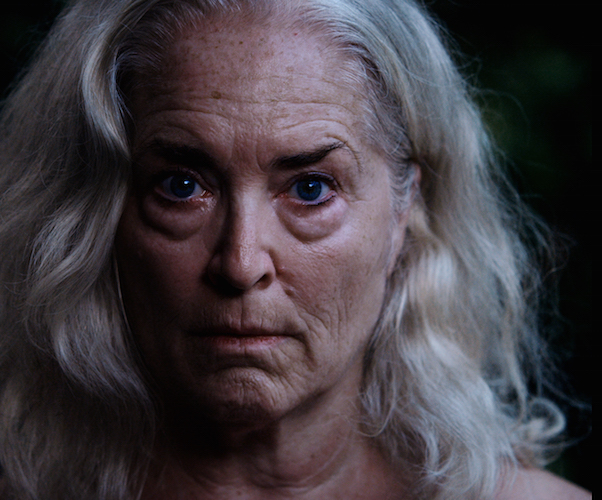Fuse Film Review: A Kibosh on “Krisha”
Krisha feels as if it was pretty much made-up-on-the-spot, the narrative’s improvisations left in the hands of clueless amateurs.

A moment of introspection in “Krisha.”
Krisha, directed by Trey Edward Shults. Coming to Kendall Square Cinema, Cambridge, MA
By Paul Dervis
Krisha is a tiny budgeted independent film out of Texas written and directed by Trey Edward Shults, making his full-length feature debut. It has been the surprise arthouse hit of several heavyweight festivals including Cannes. Various name critics have called it “a stunner,” “extraordinary,” and the director “brilliant.” The posters for this film are crawling with these mega-blurbs.
Here is the truth — Krisha is godawful. It is essentially an hour-and-a-half long home movie. The cast, with a couple of exceptions, are made up of the director’s family members. At best, the scenes come and go at random; there’s scant dialogue to prod the story along. Instead, we are repeatedly shown supposedly haunting close-ups of a disturbed aging woman in crisis — staring at herself in the mirror for minutes on end. These images are attempts to pull us into her jumbled mind, but they quickly lose their hoped for impact, degenerating into a series of painfully vacuous moments.
Interspersed with these shots are equally mundane scenes where family members are endlessly arm wrestling, preparing a turkey, playing word games, and smoking … and smoking. It is very possible that you will never see so many cigarettes consumed in an American film. It’ll make you want to cough just watching it.
The storyline, or what Shults deigns to provide, focuses on Krisha (played Krisha Fairchild, the filmmaker’s actress aunt), a sixty-something loose cannon of a gal going home to Texas to visit her estranged family for the first time in a decade. On first impression she appears to be an overweight, beat-up, pill popping Stevie Nicks wannabe. And she’s scared to come home…but not half as much as her family is fearful to have her there. What has she been doing with herself these last ten years? Who knows? And Shults doesn’t seem to want to tell us. Krisha feels as if it was pretty much made-up-on-the-spot, the narrative’s improvisations left in the hands of clueless amateurs.
What we can garner from the succession of fractured scenes is that Krisha has a drinking problem, takes a bunch of prescription drugs, and is ‘trying to get her act together.’ In contrast, her sister has her act together, at least she is human enough to welcome Krisha into her home — just so long as the aging troublemaker can keep a lid on it. Anyone surprised that Krisha won’t be able to behave, certainly not for an entire Thanksgiving weekend?
The house is filled with countless people, several generations of the family. The women do ‘woman’s work’ while the boys clown around, screaming at sports on TV and rough-housing in the back yard. Amongst the crowd is Trey (Trey? Trey? Where have I seen that name before?), a young man with a passion for making films that he has abandoned in order to go to business school. Also, he is the son Krisha left behind so many years before. Apparently she wants to reconnect and he just ain’t interested.
That sends her on a bender. Thanksgiving crashes, both figuratively and literally.
I have barely mentioned the performance of Krisha Fairchild, and she is the epicentre of this unsatisfying piece of dissolute Americana. Pity the actress solicits in droves. But caring? Not one whit. She ultimately comes across as a nasty little piece of work; it is clear that her relatives are better off without her. Certainly her son is. My guess would be that the filmmaker wants us to understand that Krisha is a victim of mental illness, but all the performer gives us is a character who is merely ridiculously self-absorbed.
Krisha might have the makings of a very depressing film about cultural and family dysfunction — if we had been given even a small reason to care about the characters. But who wants to become involved in a world this prosaic in a film that is tedious, derivative, and remarkably self-indulgent.
Paul Dervis has been teaching drama in Canada at Algonquin College as well as the theatre conservatory Ottawa School of Speech & Drama for the past 15 years. Previously he ran theatre companies in Boston, New York, and Montreal. He has directed over 150 stage productions, receiving two dozen awards for his work. Paul has also directed six films, the most recent being 2011’s The Righteous Tithe.

This is a godawful review
I’m glad you liked it.